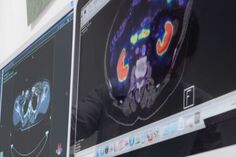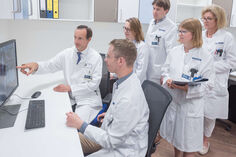KEYNOTE-867 Studie
multizentrisch
Kombination der SBRT mit einer Immuntherapie (Pembrolizumab) bei medizinisch inoperablen Patienten
Zusammenfassung
The purpose of this study is to assess the efficacy and safety of stereotactic body radiotherapy (SBRT) plus pembrolizumab (MK-3475) in the treatment of adult participants with medically inoperable Stage I or IIA non-small cell lung cancer (NSCLC).
The primary study hypotheses are:
- SBRT plus pembrolizumab prolongs Event-free Survival (EFS) compared to SBRT plus placebo (normal saline solution), and
- SBRT plus pembrolizumab prolongs Overall Survival (OS) compared to SBRT plus placebo.
Einschlusskriterien
- Has previously untreated NSCLC diagnosed by histology or cytology and confirmed as Stage I or IIA NSCLC (American Joint Committee on Cancer, AJCC) by chest computed tomography (CT) and positron emission tomography (PET) scan
- Cannot undergo thoracic surgery due to existing medical illness(es) as determined by the site's multi-disciplinary tumor board
- Has a Eastern Cooperative Oncology Group (ECOG) Performance Status of 0, 1, or 2
- Is able to receive SBRT and does not have an ultra-centrally located tumor
- Has adequate organ function within 7 days prior to the start of study treatment
- A female is eligible to participate if she is not pregnant, not breastfeeding, and at least one of the following conditions applies: a) not a women of childbearing potential (WOCBP) OR b) A WOCBP who agrees to use study-acceptable contraception during treatment and for at least 120 days after last dose of study treatment
Ausschlusskriterien
- Has received prior therapy with an anti-programmed cell death-1 (anti-PD-1), anti-programmed cell death-ligand 1 (anti-PD-L1), or anti PD-L2 agent or with an agent directed to another stimulatory or co-inhibitory T-cell receptor (e.g. cytotoxic T-lymphocyte-associated antigen 4 [CTLA-4], tumor necrosis factor receptor superfamily member 4 [OX-40], tumor necrosis factor receptor superfamily member 9 [CD137])
- Has received prior radiotherapy to the thorax, including radiotherapy to the esophagus, mediastinum, or breast
- Has received a live vaccine within 30 days prior to the first dose of study treatment
- Is currently participating in or has participated in a study of an investigational agent or has used an investigational device within 4 weeks prior to the first dose of study treatment. Note: Participants who have entered the follow-up phase of an investigational study may participate as long as it has been 4 weeks after the last dose of the previous investigational agent
- Has a diagnosis of immunodeficiency or is receiving chronic systemic steroid therapy (in dosing exceeding 10 mg daily of prednisone equivalent) or any other form of immunosuppressive therapy within 7 days prior the first dose of study treatment
- Has a known additional malignancy that is progressing or has required active treatment within the past 3 years. Note: Participants with basal cell carcinoma of the skin, squamous cell carcinoma of the skin, or carcinoma in situ (e.g. breast carcinoma, cervical cancer in situ) that have undergone potentially curative therapy are not excluded.
- Has a known hypersensitivity (≥Grade 3) to pembrolizumab and/or any of its excipients
- Has a history of (non-infectious) pneumonitis that required steroids or has current pneumonitis
- Has a known history of Hepatitis B or known active Hepatitis C virus infection
- Has an active autoimmune disease that has required systemic treatment in past 2 years (i.e., with use of disease modifying agents, corticosteroids or immunosuppressive drugs). However, replacement therapy (e.g. thyroxine, insulin, or physiologic corticosteroid replacement therapy for adrenal or pituitary insufficiency), while systemic, will be permitted for study eligibility.
- Has an active infection requiring systemic therapy
- Has a known history of human immunodeficiency virus (HIV) infection
- Has a known history of active tuberculosis (TB; Bacillus tuberculosis)
- Is pregnant or breastfeeding or expecting to conceive or father children within the projected duration of the study, starting with the screening visit through 120 days after the last dose of study treatment
- Has had an allogenic tissue/solid organ transplant






